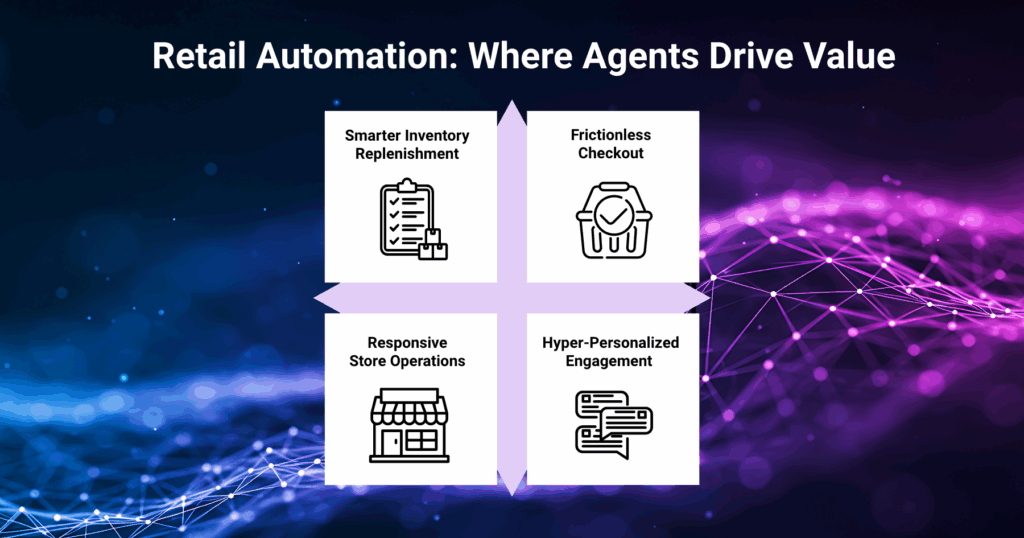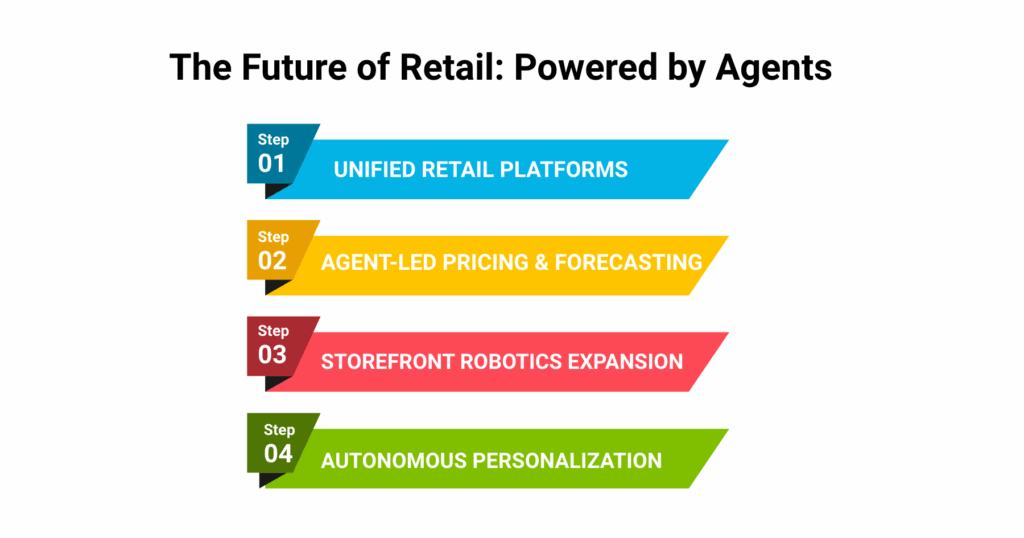Retail Automation enhances efficiency through AI, robotics, and digital workflows.
Retail automation refers to the use of digital tools, AI, robotics, and software to streamline operations, reduce manual effort, and enhance customer experience in retail environments. Increasingly, these capabilities are being orchestrated through agentic AI systems, where autonomous agents handle localized decisions across inventory, checkout, personalization, and fulfillment to scale operations intelligently and securely.
Detailed Definition & Explanation
Retail automation encompasses a broad set of technologies and services designed to optimize both front-end and back-end retail processes. It includes retail process automation such as POS integration, self-service checkout, automated inventory tracking, and robotic warehouse management. Increasingly, retailers are also adopting AI-driven retail automation services for personalized promotions, dynamic pricing, and demand forecasting.
What distinguishes agentic AI in retail automation is its ability to decentralize control. Instead of relying on static workflows, autonomous micro-agents operate independently or collaboratively across the retail stack, handling pricing logic, exception routing, service inquiries, and stock alerts in real time. These agents adapt to local conditions while adhering to enterprise-wide constraints, reducing the load on human teams while increasing operational precision.
Retailers often engage retail automation consulting or automation consultancy for retail chains to identify friction points and design end-to-end retail automation solutions. These services align automation initiatives with digital transformation retail automation goals, ensuring interoperability across systems and measurable ROI.
Listed below are some of the main types of retail automation:
- Operational Automation
Streamlines back-end tasks such as inventory tracking, staff scheduling, stock replenishment, and price adjustments. Agentic systems assign localized tasks to micro-agents that operate within store-specific contexts, adjusting plans based on real-time data and constraints.
- Customer-Facing Automation
Includes technologies like self-checkout kiosks, smart POS systems, and AI-powered chatbots to enhance in-store or online customer interactions. Agents can escalate issues, reroute support, or initiate returns automatically, improving response without human bottlenecks.
- Marketing & Personalization
Uses automation to trigger campaigns, manage loyalty programs, and deliver personalized recommendations based on real-time customer data. Agents dynamically segment audiences, generate contextual offers, and optimize delivery across channels, without relying on static campaign rules.
- Fulfillment & Logistics
Involves robotic picking systems, automated warehouse sorting, and integrated last-mile delivery coordination for faster order fulfillment. Fulfillment agents monitor order queues, predict bottlenecks, and reassign routing priorities in real time.
- Administrative Automation
Applies RPA for tasks like invoice reconciliation, return processing, and vendor communication to reduce manual workload and errors. Micro-agents embedded in these workflows can flag anomalies, enforce compliance rules, or auto-escalate edge cases to human teams.
Why It Matters

Optimizes Inventory and Supply Chain Management
Digital retail automation enables real-time visibility into inventory levels, stock movements, and order statuses across locations. Agentic AI agents can independently trigger restock alerts, prioritize SKUs, and adapt replenishment logic based on seasonality or demand shifts. This allows retailers to automate replenishment, prevent stockouts, and reduce excess inventory, especially in large-scale, multi-store environments.
• Reduces Checkout Friction and Enhances In-Store Experience
From self-service kiosks to AI-enabled cashierless stores, automation improves transaction speed and reduces wait times. Retail agents can reroute support staff based on queue pressure or flag anomalies at self-checkout points, elevating both customer satisfaction and loss prevention.
• Increases Operational Efficiency Across Store Networks
With automation in retail operations, chains can standardize workflows across stores: from staff scheduling and opening routines to pricing updates and compliance checks. Autonomous agents embedded in store-level operations can adjust tasks in response to live foot traffic, weather patterns, or delivery delays, reducing top-down micromanagement.
• Supports Personalized and Data-Driven Customer Engagement
AI retail automation helps marketers automate email campaigns, deliver real-time recommendations, and trigger loyalty offers based on purchase behavior. Agentic systems enable this personalization at scale by deploying task-specific agents that test, learn, and optimize content and offers on the fly without human intervention.
Real-World Examples
Retailers are increasingly adopting automation to enhance efficiency, cut costs, and create seamless customer experiences. These examples show how AI and automation are reshaping modern retail operations.
FD Ryze
FD Ryze enables AI-powered retail automation by deploying intelligent micro-agents across merchandising, inventory planning, and operations workflows. From forecasting demand to routing order exceptions and generating audit trails, FD Ryze helps retailers manage dynamic retail environments without overwhelming staff or IT systems.
SymphonyAI Retail CPG
SymphonyAI provides end-to-end retail automation solutions for demand forecasting, shelf optimization, and autonomous store operations. Its AI-driven platform helps large retailers improve availability and optimize assortments across store formats.
AutoStore
AutoStore’s robotic warehouse systems automate storage and retrieval operations, enabling fast order fulfillment and maximizing use of physical space. Used by global retailers for high-density storage, it reduces manual picking errors and accelerates fulfillment cycles.
What Lies Ahead

Unified Retail Automation Platforms Will Replace Patchwork Tools
Instead of managing siloed solutions for checkout, inventory, and fulfillment, retailers will adopt unified platforms that orchestrate all automation layers. These platforms will include plug-and-play AI agents for each function, offering better data flow and scalability.
• AI Agents Will Take Over Dynamic Pricing and Inventory Forecasting
Agentic AI will power continuous adjustments to pricing, markdowns, and purchase orders, based on real-time demand signals, competitor data, and supply chain constraints. Retailers will reduce waste while maximizing margin.
• Robotic Automation Will Expand Beyond Warehouses
While robotics have transformed fulfillment, the next wave will bring automation to storefronts, handling restocking, floor cleaning, and inventory scanning in real time. This shift will support leaner in-store staffing models.
• Personalization Will Be Autonomous and Context-Aware
AI retail automation tools will autonomously segment audiences, generate content variations, and optimize promotions based on channel, location, and behavior without human intervention. Marketers will shift focus to oversight and strategic design.
Discover how FD Ryze deploys AI-powered micro-agents to optimize retail operations. Request a demo today.
Related Terms
- Retail Process Automation
- Robotic Process Automation (RPA)
- Omnichannel Commerce
- Agentic AI in CPS
- Retail Operations Optimization
